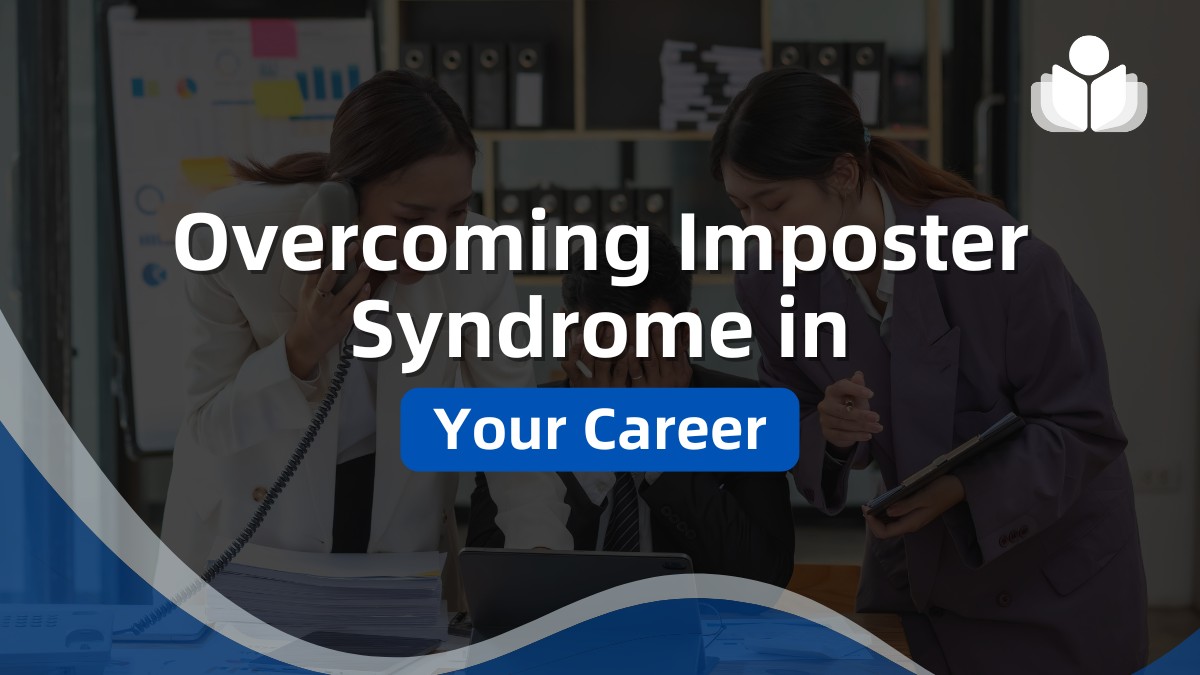Imposter syndrome is a psychological pattern in which individuals doubt their accomplishments and fear being exposed as frauds. The term was first coined in the 1970s and commonly affects high-achieving individuals. Symptoms include persistent self-doubt, attributing success to luck rather than skill, and feeling unworthy of praise or accomplishments.
Unchecked, imposter syndrome can hinder career growth, productivity, and mental well-being. It creates a cycle of self-doubt that limits confidence, curtails opportunities, and increases stress. Understanding and managing imposter syndrome is essential to building a successful career.
Understanding Imposter Syndrome
Different Types of Imposter Syndrome
- Perfectionist: Sets unrealistically high standards and feels like a failure when goals aren’t met.
- Superwoman/Superman: Overworks to prove worth, fearing inadequacy without constant effort.
- Natural Genius: Believes skills should come quickly and feels inadequate if learning takes time.
- Soloist: Prefers to work alone, avoiding help to prove competence.
- Expert: Feels unworthy if they know everything, hesitant to ask questions.
Recognizing the Signs in Your Career
Common signs include difficulty accepting praise, attributing accomplishments to luck, and over-preparing to cover perceived inadequacies. People with imposter syndrome may also avoid new challenges, fearing failure or exposure.
Common Causes of Imposter Syndrome
Imposter syndrome often arises from competitive work environments, cultural expectations, or personal traits like perfectionism. Childhood upbringing and experiences can also shape self-doubt, leading to feelings of inadequacy in adult life.
Effects of Imposter Syndrome on Career Growth
Impact on Professional Development
Imposter syndrome can hold back career growth by making individuals reluctant to take on leadership roles or pursue advancement opportunities. Avoiding visibility or self-promotion due to fear of judgment or failure can limit career trajectory.
Mental and Emotional Strain
Living with constant self-doubt leads to anxiety, burnout, and reduced job satisfaction. The mental strain from imposter syndrome can decrease productivity, creating a cycle where stress further fuels self-doubt.
Interpersonal Challenges
Fear of being found out can hinder connections with colleagues, affecting collaboration and teamwork. People with imposter syndrome may struggle to ask for support, impacting project outcomes and team dynamics.
Identifying and Challenging Negative Thought Patterns
Self-Awareness and Reflection
Recognizing self-limiting thoughts is essential to overcoming imposter syndrome. Self-awareness can be developed by keeping a journal to track negative thoughts, triggers, and specific instances where imposter feelings arise. Reflecting on these entries helps to pinpoint patterns, allowing you to understand how these thoughts impact confidence and performance.
Reframing Negative Thoughts
Reframing involves turning self-critical thoughts into constructive perspectives. For example, replacing “I don’t know enough” with “I am always learning and growing” emphasizes progress over perfection. Reframing trains the mind to see challenges as opportunities for growth instead of evidence of inadequacy.
Practicing Self-Compassion
Treat yourself with the same kindness and understanding you’d offer a friend. Practicing self-compassion involves recognizing your effort and progress, not just outcomes. This shift can reduce self-imposed pressure and create a more supportive mindset.
Using Positive Affirmations and Visualization
Positive affirmations counter imposter beliefs by reinforcing confidence. Craft affirmations that resonate, such as “I am capable and deserving of my achievements.” Visualization is also powerful. Envisioning yourself succeeding in a career scenario can help build confidence and familiarity with success.
Building Confidence and Self-Acceptance
Reviewing past successes builds self-assurance and reinforces positive perceptions of your capabilities. Create a “wins” list to highlight achievements and positive feedback, reminding you of your abilities and progress.
Setting Realistic and Achievable Goals
Setting small, realistic goals encourages steady growth and confidence. Each step forward, no matter how small, is worth celebrating. Achievable goals help you feel capable and reduce the pressure for perfection.
Embracing Lifelong Learning
Viewing your career as a journey fosters a growth mindset. Recognizing knowledge gaps as opportunities for learning rather than failures promotes a healthier perspective on development and reduces imposter feelings.
Practicing Gratitude and Acceptance
Gratitude shifts focus from shortcomings to strengths. Acknowledging your skills, experiences, and opportunities can counteract feelings of inadequacy. Accept that mistakes are part of the journey, and perfection isn’t required for success.
Seeking Support and Mentorship
Finding a Mentor or Role Model
A mentor who understands imposter syndrome can provide guidance and share their own experiences overcoming similar challenges. Learning from their journey offers insight into managing self-doubt while encouraging.
Building a Supportive Network
Connecting with supportive colleagues and professionals creates a network that offers feedback, encouragement, and perspective. Such a network can be invaluable, especially during self-doubt, helping validate your accomplishments and reinforce confidence.
Sharing Vulnerabilities with Trusted Peers
Opening up about imposter feelings with trusted peers can lead to a sense of community and reduce feelings of isolation. Seeking feedback and reassurance from those who understand your experiences provides constructive insights and support.
Embracing Growth Mindset and Resilience
A growth mindset, the belief that abilities can improve with effort—can help counter imposter syndrome by focusing on progress rather than perfection. Viewing challenges as learning opportunities shifts attention from perceived shortcomings to development, reducing self-doubt.
Developing Resilience
Resilience involves bouncing back from setbacks with self-compassion and persistence. Rather than viewing failures as reflections of worth, treating them as learning experiences promotes a healthier outlook and fosters personal growth.
Celebrating Effort and Persistence
Acknowledging hard work and determination, not just final outcomes builds resilience and counters perfectionism. Recognizing incremental progress and persistence reinforces self-worth and keeps you motivated.
Read our complete article on effective career management.
Practical Strategies for Managing Imposter Syndrome at Work
Claiming your achievements and articulating your role in them is key to building confidence. Practice speaking confidently about your skills and contributions without minimizing them, reinforcing a positive self-image.
Setting Boundaries With Perfectionism
Setting realistic standards and accepting good enough rather than perfection prevents overworking and burnout. Establishing these boundaries helps you focus on quality without letting imposter-related fears dictate your work habits.
Practicing Public Speaking and Self-Advocacy
Regularly speaking up in meetings or presentations builds confidence over time. Advocate for yourself by asking for feedback and seeking growth opportunities, gradually strengthening self-assurance in your professional environment.
Reflecting on and Redefining Success
Define success on your terms, emphasizing values, growth, and meaningful contributions rather than external validation. This personal definition shifts focus from comparison to self-alignment.
Conclusion
Overcoming imposter syndrome involves recognizing negative thoughts, building confidence, seeking support, and adopting a growth mindset. These steps, practiced consistently, help manage self-doubt and enhance well-being.
Embrace your achievements and move forward with confidence. Managing imposter syndrome is a continuous, manageable, and enriching journey. With self-compassion and perseverance, imposter syndrome can be transformed into a stepping stone for personal and professional growth.
 Sections of this topic
Sections of this topic
















